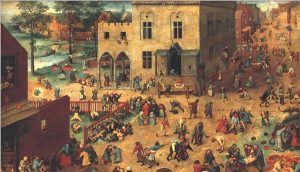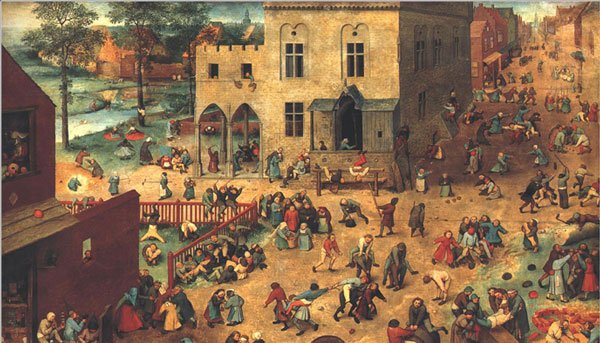
My desire to bring the nuggets of the best Urdu Poetry to the world starts with this translation. The best picture to draw out the spirit of this poem was the cover page of “homo ludens” by Jose Huizinga.
No poem can be interpreted without thinking about what may have been happening in the poet’s life and the tribulations of his mind.
Apparently this was written by Ghalib as he’s confronted by illness and is mentally preparing for death (at least in the poem he confronts the questions of existence and death). And as we pass from couplet to couplet from belittling the world as it exists, and what lay beyond as we move towards the finality of death. He was also confronting his own creating Ghalib (his own name being Assadullah) and was being happy at the same time ruing that Ghalib would live on after him
Bazeecha-e-atfal hai duniya meray aage
Hota hai shab-o-roz tamasha meray aage
(Baazee – game; Bazeecha – small game; atfaal – juvenile/ child; duniya – world; shab-o-roz – night and day; tamasha – show)
The world seems to me like a child’s playground
Endlessly, the play of life is enacted before me
(they put up a show before me which looks like a child’s play
where daily they have this exhibition of life from dawn to dusk)
Ek khel hai aurang-e-Suleman meray nazdeek
Ek baat hai aijaz-e-Masiha meray aage
(aurang – the color of water, some also have interpreted it as a throne; suleman – solomon, wise ruler; ejaz e masiha – micacles of messiah)
Near me, the King’s wonderful and transparent rule, seems an act
Further ahead, there is a talk about the miracles of the messiah
(let’s start looking at some plays that are happening around me
the kingmanship of the good ruler, the miracles of a messiah
I am not sure if I should care..)
Juz naam nahin surat-e-aalam mujhe manzoor
Juz waham nahin hasti-e-ashia meray aage
(Juz – without; surat – face, aalam – creation, world; hasti-e-aashiya – worldly existence)
Without a name, I can’t accept, these interpretations of the world
Without a doubt, is not, this world of existence that confronts me
(unless the meet the creator of these, as I have my doubts about the creations
even when I can see so how do believe what I can’t see, for example..)
Hota hai nihan gard mein sahra meray hote
Ghista hai jabeen khaak pe dariya meray aage
(niha(n) – vanish, gard- dust; sehra – desert; ghista – grovels, rubs; zabin – forehead; khak – dirt)
These dunes of sand vanish into nothingness as I look on
The groveling ocean withers away into dust before me
(so when things that happen before my eyes are difficult to
believe, how can I bring myself to accept what is told to me)
Mat pooch ke kya haal hai mera teray peechey
Tu dekh ke kya rang tera meray aage
Do not look at the colors draining from me after you leave
Just look at the colors filling you up just by my presence
(So I am not even sure if you’ve painted me or is it that I have
painted you in such colors that now people think you exist..
sometimes I believe that Assadullah was talking to Ghalib
his name in this couplet praising himself for creating Ghalib
or talking to himself as the creator..)
Sach kahte ho khudbeen-o-khuddara hoon, na kyun hoon
Baitha hai butt-e-aaina-seema meray aage
(khud – self; been – to see; butt – idol; khudaara – proud; aainaa – mirror; seema – limit)
True you say that I am egoistic and prudish, why not I be
You sit before me, like a limited mirror casting my reflections
(You may think now that I take too much credit in the way
I interpret the world, but then maybe you have a narrow mind)
Phir dekhiye andaaz-e-gul afshaani-e-guftaar
Rakh de koi paimana-o-sahba meray aage
(andaaz – style; gul- flower; afshani – effusion/ glory; guftaar- conversation; paimana – shot glass; sahba – sheet of paper, wine)
Look on how I talk about charms of flowers and their style
As long as there is available wine and a blank paper before me
(Look at what even I can create and weave once you offer me a good meal and charms and of course a blank page, so maybe someone else created the above fantasies about God like this)
Nafrat ke gumaan guzre hain, main rashk se guzra
Kyunkar kahoon, lo naam na unka meray aage
(Nafrat – hatred; gumaan – perception; rashk – envy, jealousy; kyonkar – why, after all)
What passed, seemed like hatred, I was besieged by envy
That’s why I request you not to take her name before me
(I have been through the pangs of hatred and malice as a competing creator,
that I request you not to revoke the past by mentioning the assumed creator)
Imaan mujhe roke hai jo kheenche hai mujhe kufr
Kaaba mere peechhe hai kalisa meray aage
(imaan – honesty; kufra – sins / temptation; kaaba – Holy place for Muslims; Kaleesa – Church)
Truthfulness holds me back, when temptations allures me
As I put a God behind me another one now confronts me
(my honesty is holding me back from the sins that tempt me
which God is better, the one that I left or one that seeks me)
Aashiq hoon pe mashooq-farebi hai miraa kaam
Majnun ko bura kahti hai Laila meray aage
(Aashiq – lover; mashooq – beloved; farebi – cheating)
As a lover, I live off the art of fooling the beloved
Even Laila berates Majnun, her lover before me
(I love so I spin tales that fool the beloved, every lover confides in me,
so what do you talk of someone else’s creations born out of their love)
Khush hote hain par wasl mein yun mar nahin jaate
Aaee shab-e-hijran ki tamanna meray aage
(wasl – reality; shab – night; hijra – departure; tamanna – wish/desire)
I feel happy about reunion but would not die for it
Ahead lies the desire for the night of separation
(Sure you feel happy for other creations, but to die for them?
Well then, I too have a strong desire to give it all up and go)
Hai mauj-zan ik qulzum-e-khoon kaash yahi ho
Aata hai abhi dekhiye kya kya meray aage
(mauj_zan – exciting, wave; qulzum – sea; khoon – blood)
Waves are rising inside the sea of my blood, was it this?
Or could be, something else lies ahead, if this is not the end
(Is the rising of waves of the sea of blood the end?
or is there something more that has to roll out?
he was actually suffering from boils and other maladies
which was ascribed to overheating of blood, which explains)
Go haath ko jumbish nahin aankhon mein toh dum hai
Rahne do abhi saaghar-o-meena meray aage
(jumbish – feel; saaGHar – sea, flood, sometimes interpreted as wine; meena – light, sometimes interpreted as glass goblet)
As I die, as my hands can no longer feel, my sight is still alive
Let this sea of lights (entrapments of life) remain before me
(as I lay dying, my hands go numb, my eyes can still see
let this play of light continue before me as I pass out)
Hum-pesha-o-hum-mashrab-o-humraaz hai mera
Ghalib ko bura kyun kaho achha meray aage
(ham_pesha – of the same profession; ham_masharb – of the same habits/a fellow boozer; ham_raaz – confidant)
he is my confidant, my drinking mate, my peer
Why speak ill of him, he’s been good to me
(Ghalib is my everything, my peer my mate
he is the good I have, why speak ill of him?)
I was intrigued by Khushwant Singh’s regular rants about his inability to translate Ghalib. I spent donkey years studying poetry in all forms and spending hours on various expressions by different poets given my limited understanding of this world. As I approach the latter half of my life, I am propelled by a desire to share whatever little I was able to interpret. I know that it is a huge mountain that I confront, and can only share what it looks like from where I stand. Hope you do like it partially. I know that some may hate this attempt since I wanted to bring a freshness in my interpretations and have stayed away from many interpretations that lie before me in an attempt to re-read Ghalib’s mind. However, each and every translation has contributed to my understanding of Ghalib’s beautiful poetry, and I am truly thankful to countless people who have done so. Even if I can give a little more insight by trying to re-imagine the situation, I would have done justice to my part, my contribution.
